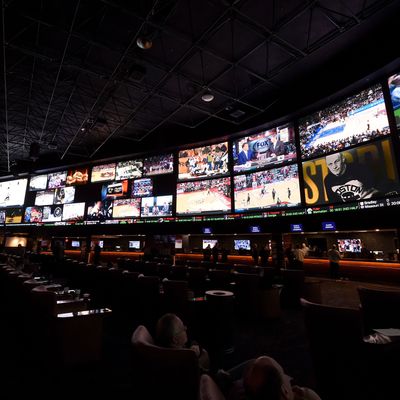
The last time Americans could walk into a Las Vegas sports book during the Olympics and make a bet on their country, Michael Johnson was still winning medals, Vince Carter was making a towering Frenchman famous, and Michael Phelps was debuting in the Games as a 15-year-old also-ran on the U.S Olympic swim team. This year, all that changes.
For the first time since the 2000 Sydney Games, Las Vegas sports books are accepting bets on the Olympics this summer, providing casinos a financial boost in the dog days of August, keeping bettors glued to the TV as Carmelo, KD, and company attempt to cover massive points spreads, and delivering the final blow to the idea of Olympic purity.
For years Americans could bet on the Olympics in Vegas, but that right was stripped away in 2001 thanks largely to Senator John McCain. His Amateur Sports Integrity Act would have banned betting on all amateur sports in order to protect college athletes from “the harmful effects of gambling,” he wrote at the time.
But college sports are a big business in Vegas and Nevada’s sports books wanted nothing to do with McCain’s law. So they cut a deal. Betting on college sports would remain legal, but betting on other amateur competitions, such as the Olympics and the Little League World Series, would no longer be allowed.
No big deal, Vegas thought at the time. There was never much interest in Olympic events anyway. If taking away the ability to post odds on amateur powerlifting would appease McCain, then the sports books were happy to play along — as long as they got to keep March Madness.
About a year ago though, some Las Vegas power players started pushing for the Nevada Gaming Commission to revise its regulations. When it did, chairman Tony Alamo said the change was less about making fat stacks on racewalking bets, than ensuring Las Vegas’s position in the global hierarchy of sports betting. Previously, sports books in other countries and offshore willingly accepted bets on the Olympics. When Las Vegas joined them, Alamo said, it “globalizes the legitimacy of what we do.”
It also gives bored bettors a way to stay busy during the Olympics. Without the ability to bet on the summer Games, sports books would be taking action on regular-season baseball, preseason football, and little else. Now they’ll be able to rake in the cash from those eagerly watching the rowers in Rio.
Except, Jay Kornegay, vice-president of the Westgate SuperBook, doesn’t expect to rake in much cash. “We expect it to be very minimal,” he says. Also, he doesn’t expect to take any bets on rowing. In fact, despite the diversity of sport in the Olympics, Kornegay is certain that basketball, one of the boring old big four, will draw the majority of betting action this summer. “It won’t even be close,” he says.
For basketball fans bored by American dominance at the Olympics, this could be huge. Watching the U.S. take on a team like Nigeria, which it did Monday night in an exhibition, isn’t very exciting. But plunk down $100 against a 49-point spread, and suddenly you’re on the edge of your seat hoping the Americans run up the score enough for you to cash in.
Along with basketball, Kornegay expects to take bets on soccer, track and field, and golf, which is new for the 2016 Games. When it comes to lesser-known competitions such as fencing, he’s not so sure. If he sees a way to make money though, he’ll adapt. “Any event that receives a lot of attention from the media, there’s a good chance that we could post it,” he says. “Whether it’s popular because of controversy or a great story and or an American competing for a gold medal.”
If there’s any part of you sad to see the purity of Olympic amateurism tarnished by a craven ploy to further fatten Las Vegas’s pockets, let it go. Amateurism in the Olympics stopped mattering a long time ago. Professionals will rule the games in Rio, just like they have for decades. Some are paid to play when they’re not wearing their country’s colors — basketball, soccer, and tennis players among them — and some rake in cash from endorsers eager to glom on to their Olympic glory — Michael Phelps and Usain Bolt, for example.
Introducing betting to the equation hardly tarnishes the Games, in part because everyone else around the world was already betting on the Olympics anyway. But also because it would take a lot more than the moral ambiguity of gambling to cast a pall over an an event that’s as riddled with corruption as the Olympics.





























